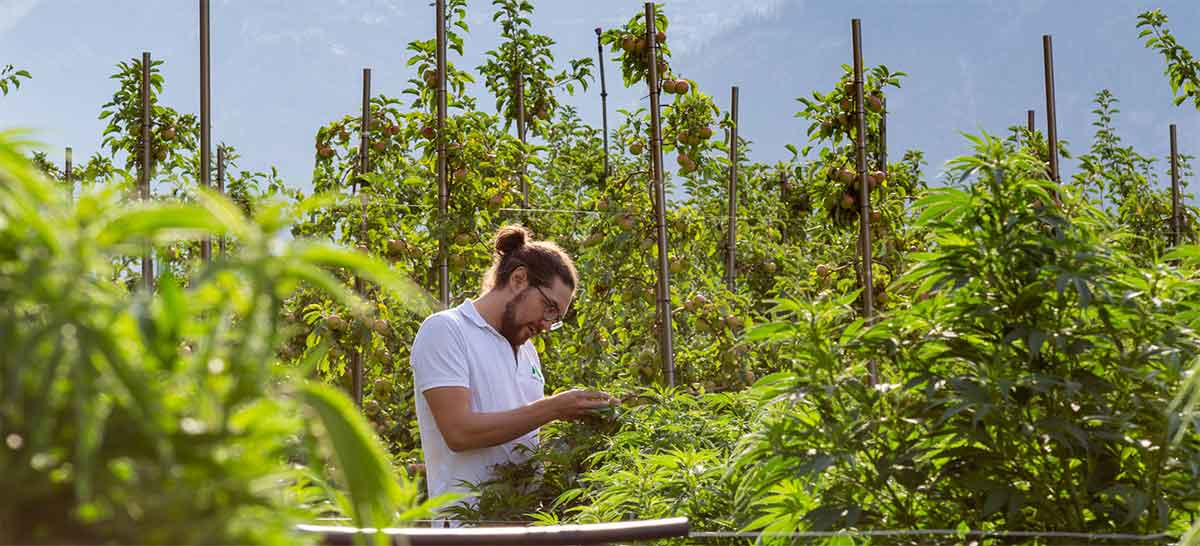
CBD stands for cannabidiol, one of the molecules found in the cannabis plant, more commonly known as "hemp". This molecule is found in varying quantities, alongside over a hundred other molecules known as cannabinoids. Cannabinoids are the active ingredients found in the cannabis plant. The best known of these is THC, responsible for addiction and psychotropic effects. At Naturalpes, we work mainly with the CBD molecule, cannabidiol.
At Naturalpes we work with CBD in several forms:
Cannabinoids interact with our neuroreceptors. THC, for example, has psychotropic effects. CBD, on the other hand, has none. As a result, it does not act on the same receptors as THC.
Specifically, CBD interacts with the endocannabinoid system, naturally present in all vertebrates. More specifically, it interacts with CB1 and CB2 receptors. The latter regulate certain biological processes, such as (non-exhaustive list):

The cannabis plant (hemp) has been known and used by mankind for thousands of years. We know about hemp fibres (or textile hemp), but marijuana plants have also been used for their therapeutic and medicinal virtues: "The first evidence of its use dates back to more than five thousand years BC. Evidence of cannabis use dates back four thousand years in China, and three thousand BC in Turkestan.
This long experience with cannabinoids gives these molecules a wide margin of safety.
After all, the prohibition of cannabis and its classification as a psychotropic drug dates back to the 1930s. And its history has more to do with issues of morality, politics and even racism than public health. That's what you see when you read Marijuana when the United States banned pot for funny reasonsa story taken from a blog hosted on the France Info website.
Whatever the case, this does not mean that the effects of CBD cannabis are comparable to miraculous virtues. Nor, conversely, that it has no efficacy. It has real potential for medical, therapeutic and pharmaceutical use.
Cannabinoids, for example, are found in certain medications. In particular, they are used to treat multiple sclerosis (MS) and certain forms of epilepsy.
First of all, scientific research in this field is still limited. This can be explained by the plant's legal status. Several countries seem to be adapting their legislation and have launched large-scale studies on medical cannabis. These include Australia, the UK and Switzerland.
These studies - coupled with other more targeted research - should make it possible to know precisely in which situations and for which people CBD is useful. It is therefore essential to seek specialist advice before taking CBD. Indeed, the choice and dosage of products will vary according to the problems and morphology of the consumer.
According to advances in scientific research on CBD, its interaction with the body seems to be limited to sensations of well-being. This implies very limited side and adverse effects.
According to various research studies, the benefits of CBD stem from its action on the endocannabinoid system (ECS). A very important system, since it "is involved in key biological processes such as sleep, appetite, pain and memory", as stated on the website of the University Hospitals of Geneva (HUG).
Some uses of cannabinoids, notably CBD, are also being applied to pets. Particularly for behavioral disorders in dogs and cats. CBD's active ingredients are said to have an effect on all mammals.
It can be found in various forms:
In Switzerland, since 2011, cannabis containing less than 1% THC has no longer been regulated by the Narcotics Law (LStup, SR 812.121).
CBD, in itself, is also not governed by this law, as it has no psychotropic effects.
This led to the first authorization to sell CBD in late 2016 in the canton of Schaffhausen, 5 years ahead of our French neighbors. A lapse of time that makes Switzerland - and its producers like Naturalpes - pioneers when it comes to CBD.
After a saturation of supply, only the strongest companies survive. This is the case with Naturalpes, which has proven itself in the industry to the point of having established itself with some Swiss pharmaceutical wholesalers and numerous pharmacies and herbalists.
Many countries have legalized, decriminalized or regulated cannabis and, by extension, CBD. Whether for cannabis production, sale or consumption of flowers and derived products.
In 2018, a study by Le Monde newspaper showed that 1.5% of the world's population had legal access to recreational cannabis. This represented - at the time - nearly 110 million people.
As we said above, it's essential to be well-informed before taking CBD. If you're using medication, ask your doctor for advice first, and then the Naturalpes teams will be there to help you.
We specialize in customer support and follow-up. A follow-up sheet and dosing guide can be provided.
Because of our human dimension, we have set up an instant messaging service via our website, giving you direct access to a member of our team.
Take advantage of our offers and stay informed! By subscribing to our newsletter, you will receive a 10% discount on your next order for any new subscription.